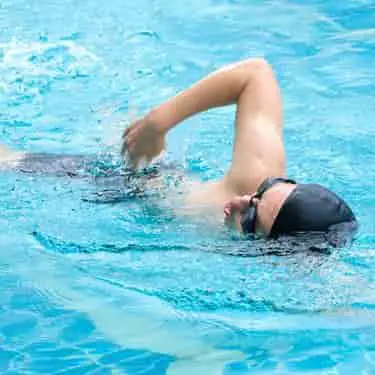I recently switched swimming pools from a public standard competition pool heated to 25°C (77°F) to a franchise gym pool heated to 29.2°C (84.5°F).
As well as noticing a big difference in water temperature on my skin, I noticed a dramatic change in swimming performance as I started swimming faster overnight.
I had to wonder if the warmer water was improving my swim speeds and to my surprise; I discovered that the warmer water was directly helping me.
Research has shown that warmer water promotes faster swim times, therefore you could see an increase in swim speeds in warmer water. Warmer water appears to have a direct impact on swimming speed and heart rate.
There is a downside to warm water, however; water that is too warm can have a negative impact on your body by inducing heat exhaustion. In addition, the increased heart rate seen in warmer water could be dangerous for some.
From my own recent experience of swimming in warm water, I had to dig into the current research to understand how water affects swim speeds.
In this article, I will share what current research has revealed about the impact of water temperature on swim performance, covering:
- Do you swim faster in warm or cold water?
- What is the ideal temperature for swimming?
- Do Olympic swimmers swim in warm water?
- What water temperature is too cold to swim in?
- What water temperature is too hot to swim in?

Do You Swim Faster In Warm Or Cold Water?
Research has shown that warmer water can help us swim faster.
From my research, there is one particular study that stands out and that is from 1993, which was published in the Journal For Sports Medicine And Physical Fitness. [source]
This study tested 15 male sprint swimmers swimming 100m and 15 comparable endurance competitors swimming for 30 minutes.
Water temperatures tested were:
- 20°C (68°F)
- 26°C (78.8°F)
- 32°C (89.6°F)
The study looked at swimming speed, heart rate, and lactate production.
In conclusion, with the swimmers swimming at their best, the highest heart rate, the highest lactate level and the fastest speed were all observed at the hottest pool water temperature of 32°C (89.6°F).
In comparison, all the results, including swimming speed, were much lower at the colder water temperature of 20°C (68°F).
From this study, they concluded that water temperature has a direct impact on swimming performance, therefore you could conclude that you will swim faster in warmer water.
For clarity, the recorded swim times and average swimming speed of the performing sprint swimmers, swimming a 100m freestyle of maximum effort, are shown in the following table.
| Temperature | 20°C (68°F) | 26°C (78.8°F) | 32°C (89.6°F) |
|---|---|---|---|
| Swimming Time (s) | 61.23 ±2.48 | 59.28 ±1.13 | 58.74 ±2.05 |
| Average swimming Speed (m/s) | 1.636 ±0.066 | 1.689 ±0.057 | 1.704 ±0.057 |
You can read more about these results in the published paper, Effect of water temperature on performance, lactate production and heart rate at swimming of maximal and submaximal intensity [1]
What Is The Ideal Temperature For Swimming?
The ideal temperature for swimming depends on the swimming activity level.
The World Health Organization considers water temperatures between 25.5°C (78°F) to 30°C (86°F) comfortable for swimmers. [source]
Since water temperature has a direct impact on performance, FINA has very strict rules on pool water temperatures for competition.
The following table details the FINA water temperature guidelines, depending on the water activity. [source]
| Swimming Activity | Water Temperature |
|---|---|
| Standard Competition Pools | 25°C to 28°C (77°F – 82.4°F) |
| Olympic Pools | 25°C to 28°C (77°F – 82.4°F) |
| Water Polo | 26°C ±1°C (78.8°F) |
| Synchronized Swimming | 27°C ±1°C (80.6°F) |
| Diving | 26°C Minimum (78.6°F) |
Do Olympic Swimmers Swim In Warm Water?
The temperature of Olympic swimming pools is carefully controlled and must fall between 25°C to 28°C (77°F – 82.4°F).
Although FINA has some specific water temperatures for certain water activities, in general, these fall between 25°C to 28°C (77°F – 82.4°F).
Therefore, Olympic swimmers will swim within a temperature range of between 25°C to 28°C (77°F – 82.4°F). [source]
Olympic swimmers exert so much energy when they swim that swimming in warm water is very dangerous for athletes. It is possible to get heat exhaustion which can be fatal.
In 2010, Fran Crippen died in an open water race due to excessively warm water temperatures. Because of this tragedy, FINA implemented a guide for open water races where the temperature range should be between 16°C (60.8°F) to 31°C (87.8°F) at the extremes. [source]
It is very dangerous for high-performance athletes, working very hard in the water to be swimming in very warm water.
What Water Temperature Is Too Cold To Swim In?
Cold water is very dangerous and can be fatal.
If water is too cold, it can induce then cold water shock, which causes a quickening of breathing and heart rate.
The National Centre For Cold Water Safety recommends that you treat any body of water that is less than 21°C (70°F) with caution.
Water temperature between 10°C-15°C (50°F-59°F) is dangerously cold and maximum cold water shock happens in this region. [source]
As mentioned, FINA (the body recognised by the International Olympic Committee for administering international competitions in water sports) restricts the minimum water temperature on open water races to 16°C (60.8°F). [source]
It is important to understand what cold water means and what is too cold to swim in. To learn more about cold water swimming, check out this article which covers the topic in much greater detail: How Long Should You Stay In Cold Water? (When to get out)
What Water Temperature Is Too Hot To Swim In?
As lovely as warm water may feel on our skin, water that is too hot to swim in is considered dangerous because of the risk of overheating.
Currently, FINA has set 31°C (87.8°F) as the maximum water temperature to swim in for open water races.[source]
Maximum pool temperature, including that for the Olympic pools, should not exceed 28°C (82.4°F).
Warm water is uncomfortable and dangerous to swim in for athletes as they risk over-exertion and heating. This is a genuine threat to swimmers, which is why the upper water temperature needs to be controlled for competition.
Final Thoughts
The temperature of the water has a direct impact on swimming performance. Research has found that you will swim faster in warmer water.
However, it is important to note that warm water is uncomfortable and dangerous for athletes as they risk over-exertion and overheating.
FINA, the international body that regulates competitions in water sports, has very strict rules on pool water temperatures for competition. In general, these guidelines fall between 25°C to 28°C (77°F – 82.4°F) for swimming pools. Maximum pool temperature should not exceed 28°C (82.4°F).
For outdoor swimming races, the maximum water temperature is regulated at 31°C (87.8°F) by FINA.
Although warmer water can enhance our swimming performance, it is important to be mindful of water temperature and not over-exert ourselves in warmer water as we could risk heat exhaustion, which can be life-threatening. [source]
References
[1] Mougios V, Deligiannis A. Effect of water temperature on performance, lactate production and heart rate at swimming of maximal and submaximal intensity. J Sports Med Phys Fitness. 1993 Mar;33(1):27-33. PMID: 8350604.
